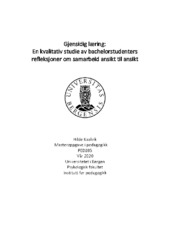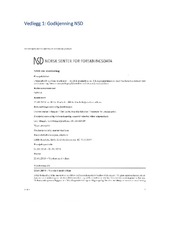| dc.contributor.author | Kaalvik, Hilde | |
| dc.date.accessioned | 2020-06-26T04:30:06Z | |
| dc.date.available | 2020-06-26T04:30:06Z | |
| dc.date.issued | 2020-06-26 | |
| dc.date.submitted | 2020-06-25T22:00:33Z | |
| dc.identifier.uri | https://hdl.handle.net/1956/22992 | |
| dc.description.abstract | Dette er en kvalitativ studie som handler om bachelorstudenters refleksjoner om samarbeidslæring ansikt til ansikt på Campus ved NTNU. Samarbeid er studiens hovedtema. Temaet belyses ut fra teori om samarbeidslæring basert på et systematisk forskningsreview og den har en studentsentrert tilnærming til læring. Forskningsbasert kunnskap om samarbeid mellom studenter vektlegges i flere offentlige dokumenter og utredninger basert på forskning der det kommer fram at en studentsentrert tilnærming til læring fremmer dybdelæring. Likevel er innføring av samarbeidslæring som undervisningsmetode i høyere utdanning en utfordring på grunn av flere faktorer. Forskningsspørsmålene i denne studien er: «Hva forteller bachelorstudentenes refleksjoner om samarbeid om den enkeltes læringsprosess?» Et underspørsmål som er ment å utdype hovedspørsmålet er: «Hvordan opplever bachelorstudentene å samarbeide, og hvordan beskriver de egne erfaringer med samarbeid?» Oppgavens teoretiske forankring er basert på et sosialkonstruktivistisk vitenskapsteoretisk perspektiv. Jeg har videre tatt utgangspunkt i Vygotskijs kultupsykologi, Johnson og Johnsons sosiale avhengighetsteori, Weick og Roberts teori om Heedful Interrelating og Antonovskys koherensteori. Oppgavens datamateriale består av tre fokusgruppeintervjuer med 13 bachelorstudenter; ti barnevernspedagogikkstudenter og tre sosionomstudenter. Basert på stegvis-deduktiv induktiv analyse av datamaterialet i kombinasjon med Nvivo12 kategoriserte jeg de empirinære kodene i to hovedtema: 1) Diskusjoner og konstruktive konflikter som ledd i samarbeidslæring. 2) Organisatoriske faktorer som fremmer samarbeidslæring. Funnene indikerer at lærerens rolle er å være en veileder som må jobbe aktivt og målbevisst for å utvikle et trygt læringsmiljø for studentene. Studentenes rolle er å være aktivt involvert i egen læringsprosess og ha et bevisst forhold til hva samarbeidslæring forutsetter. Funnene indikerer også at det er noen spenninger mellom faglærer og studenter, som kan ha sammenheng med ulik forståelse av samarbeidets målsetting, ansvarsfordeling og faglærers involvering i samarbeidet. På bakgrunn av funnene og valgt teori kan det tyde på at faglærere i høyere utdanning bør ta mer ansvar for å ivareta studentenes læringsprosess i samarbeid. Nøkkelord: Samarbeidslæring, bachelorstudenter, meningsskaping, gjensidig læring, kvalitative analyse, Nvivo12 | en_US |
| dc.description.abstract | This is a qualitative study discussing bachelor students’ reflections on collaborative learning face to face on campus at NTNU, a Norwegian university. Collaboration is the main subject of the study. The topic is interpreted through theory of collaboration created from a systematic review and the study has a student-centred learning approach. Evidence-based knowledge about collaboration between students is emphasized in several public reports and research investigations arguing that a student-centred approach promotes deep-learning. Nevertheless, the implementation of collaboration as a teaching method in higher education is a challenge due to several factors. The research questions in this study states as follows: “What can we learn from bachelor students’ reflections about collaboration about the individual learning process?” A sub-question which intend to elaborate the main question is: “How do bachelor students’ experience to collaborate, and how do they describe their own experiences with collaboration?” The theoretical foundation of the study is based on a social constructivist perspective. I have also included Vygotskijs Cultural Psychology, Johnson and Johnsons Social Interdependence Theory, Weick and Roberts Theory of Heedful Interrelating and Antonovskys Theory of Coherence. The data material is based on three focus group interviews with 13 bachelor students; ten Child Welfare Work students and three Social Work students. Based on Stepwise-Deductive Inductive analysis of the data in combination with Nvivo12 I categorized the empirical codes into two main themes: 1) Discussions and constructive conflicts as part of collaborative learning. 2) Organizational factors which promote collaborative learning. The findings suggest that the teacher’s role is to be a supervisor working actively and determined to make a safe learning environment for the students. The student’s role is to be actively involved in their own learning-process, knowing how to cope with collaborative learning. The findings also indicate that there is some tension between the students and teachers, which may be related to conflicting understandings of the collaboration objectives, responsibilities, and the involvement of the teachers in the collaboration learning process. Based on the findings and the chosen theory, it may indicate that teachers in higher education should take more responsibility in the students learning process in collaboration. Keywords: Collaborative Learning, Bachelor Students, Sense-Making, Mutual Learning, Qualitative Analysis, Nvivo12 | en_US |
| dc.language.iso | nob | |
| dc.publisher | The University of Bergen | |
| dc.rights | Copyright the Author. All rights reserved | |
| dc.title | Gjensidig læring: En kvalitativ studie av bachelorstudenters refleksjoner om samarbeid ansikt til ansikt | |
| dc.title.alternative | Mutual Learning: A qualitative study of Bachelor Students' reflections of collaboration face to face | |
| dc.type | Master thesis | |
| dc.date.updated | 2020-06-25T22:00:33Z | |
| dc.rights.holder | Copyright the Author. All rights reserved | |
| dc.description.degree | Masteroppgave i pedagogikk IKT | |
| dc.description.localcode | PED396 | |
| dc.description.localcode | MAPS-PEDIK | |
| dc.subject.nus | 724112 | |
| fs.subjectcode | PED396 | |
| fs.unitcode | 17-42-0 | |

